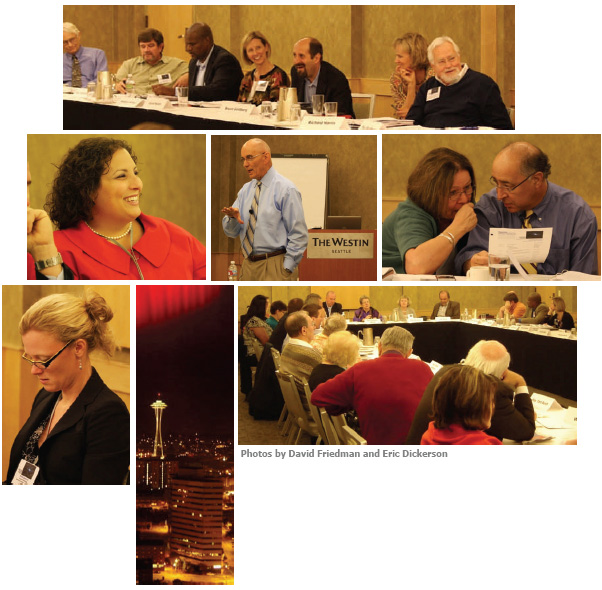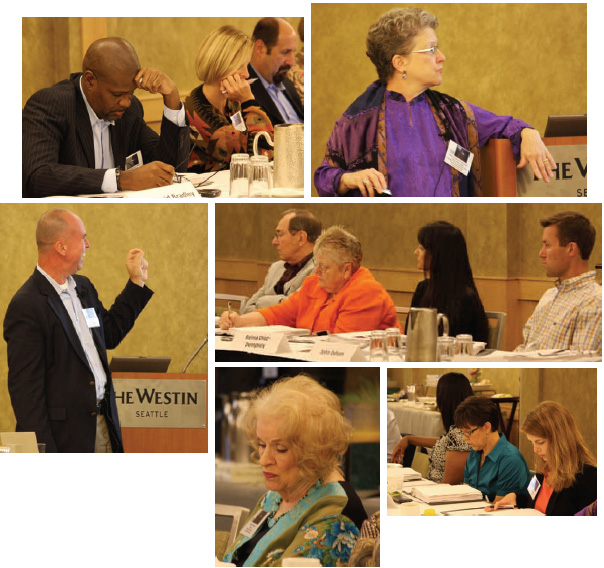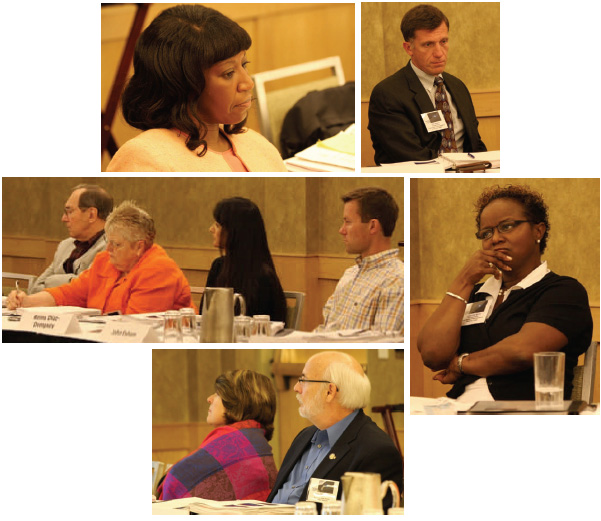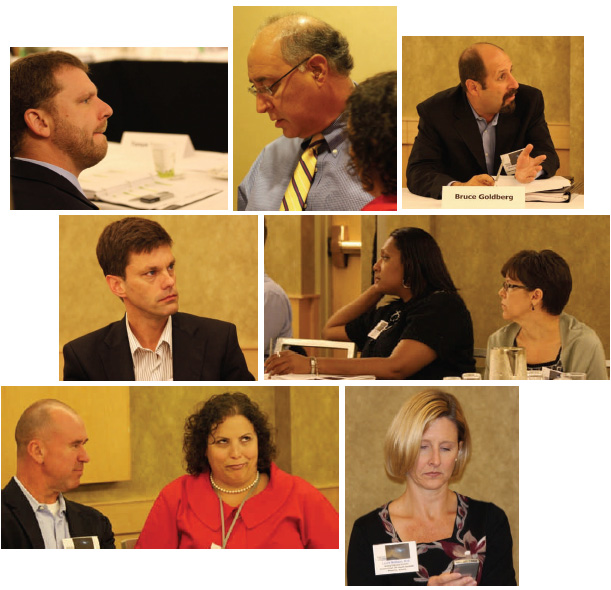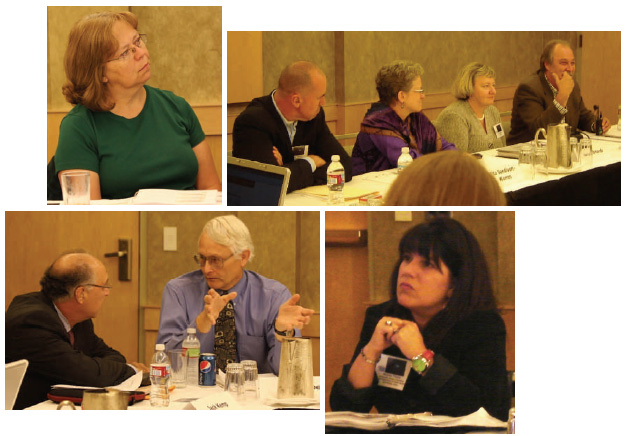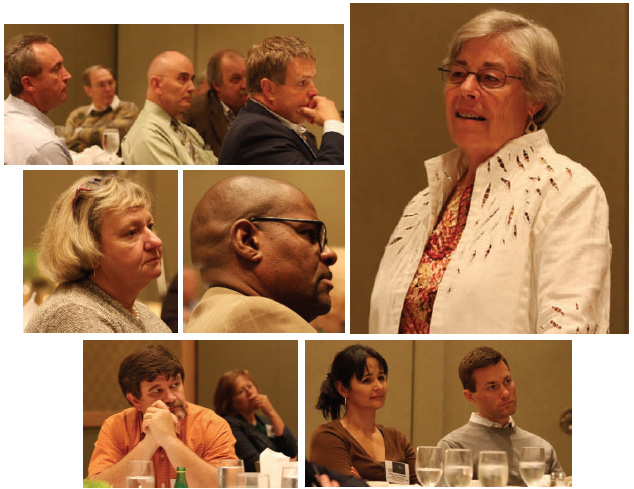
 |
|
Addiction Studies Program for the States
September 10-12, 2009 Workshop
Seattle, Washington
The September 2009 workshop of the Addiction Studies Program for the States was
sponsored by Wake Forest University School of Medicine, National Families in Action,
the Treatment Research Institute, and the National Conference of State Legislatures.
Teams from four states, Arizona, Iowa, Kentucky, and Oregon, attended.
|
|
|
Participants
What Participants Said
Faculty
Agenda
|
|
| Workshop Participants |
| |
|
|
Arizona Team
Representative David T. Bradley
Arizona House of Representatives
Phoenix, Arizona
Tonya Hamilton
Project Director
Access To Recovery
Phoenix, Arizona
Senator Linda Lopez
Arizona Senate
Phoenix, Arizona
Laura K. Nelson, MD
Acting Deputy Director
Arizona Department of Health Services
Division of Behavioral Health Services
Phoenix, Arizona
Tammy Paz-Combs
Director
Governor’s Office for Children, Youth,
and Families
Phoenix, Arizona
Eden Rolland
Health Committee Analyst
Senate Research Staff
Phoenix, Arizona
Dr. Rodgers Wilson
Chief Medical Officer
Single State Agency
Arizona Department of Health Services
Division of Behavioral Health Services
Phoenix, Arizona
Kentucky Team
Representative Tom Burch
Kentucky Legislature
Louisville, Kentucky
Réina Diaz-Dempsey
Deputy Commissioner
Department for Medicaid Services
Frankfort, Kentucky
John Esham
Deputy Policy Advisor
Office of the Governor
Frankfort, Kentucky
Donna J. Hillman
Director
Division of Behavioral Health
Frankfort, Kentucky
Van Ingram
Acting Director
Kentucky Office of Drug Control Policy
Justice and Public Safety Cabinet
Frankfort, Kentucky
|
|
Iowa Team
Representative Deborah L. Berry
Iowa Legislature
Waterloo, Iowa
Representative Mark Smith
Iowa Legislature
Marshalltown, Iowa
Mark Vander Linden
Coordinator
Office of Problem Gambling Treatment
and Education
Iowa Department of Public Health
Des Moines, Iowa
Michele Tilotta
Community Health Consultant
Iowa Department of Public Health
Des Moines, Iowa
Senator Mary Jo Wilhelm
Iowa State Senate
Cresco, Iowa
Oregon Team
Claudia Black
Health Policy Advisor
Office of the Governor
Salem, Oregon
Bruce Goldberg, MD
Director
Department of Human Services
Salem, Oregon
Richard Harris
Interim Assistant Director
Addictions and Mental Health Division
Department of Human Services
Salem, Oregon
Representative Ron Maurer
Oregon Legislature
Salem, Oregon
Senator Joanne Verger
Oregon Senate
North Bend, Oregon
Max Williams
Director
Oregon Department of Corrections
Salem, Oregon
Kentucky Team, continued
Representative David A. Watkins, MD
Kentucky Legislature
Henderson, Kentucky
Senator Jack Westwood
Kentucky Senate
Frankfort, Kentucky
|
| |
|
|
|
|
What Participants Said about the September 2009 Workshop
|
|
What Does “Investing in Substance Abuse Services” Mean? Allison Colker
• The questions Alison asked were exactly what was needed.
• Served to set the stage for our state discussion of the need to make some difficult decisions.
A History of Drug Abuse and Addiction in the U.S. and Scientifically Reliable Information on the Internet. Sue Rusche
• Really enjoyed both of Sue’s presentations. She presented very useful information for us to reference in our state and work.
• Very interesting. Historical perspective is important. Placed present in context.
The Biology of Addiction and Public Policy. David Friedman
• Excellent information for the partners who didn’t have an abundance of substance abuse knowledge. Like the way it was presented as well as the information.
• This was truly a great presentation and one that I’m glad I could hear. Intriguing! Good research.
National Quality Forum Voluntary Consensus Standards. Jack Kemp
• Superior. Review of literature stimulates conversation.
Treatment: The Chronic Disease Model. Jack Kemp
• Mr. Kemp’s presentation provided helpful information in addressing the continuum of care for substance abusers—clinical and recovery support services are needed to keep the client engaged in treatment.
• Excellent presentation – easy to explain to others. New model for me.
Environmental Strategies to Prevent Substance Abuse, Save States Money. Joel Grube
• Very knowledgeable presenter.
• The data on underage drinking really got my attention.
Breakout Sessions
• I thought this time was fruitful for our state—facilitated communication enabled dialogue, ideas, and comments shared.
• Session was great. So many ideas and issues that more time for discussion and planning would be great!
• I thought our planning session was focused, productive, collaborative, informative, and very forthright and honest!
• I thought this session was very productive! Time with my team was so valuable—and other members said the same.
• I think we came up with a good, manageable plan. Facilitator was great—guided us along and asked the tough questions.
• Best part of the conference. Great goal planning session!
Treatment for Substance Use Disorders Makes Cents. Rita Vandivort
• Good overview of spending for substance abuse treatment and reform discussions – cost/benefit information very helpful.
• It was pretty packed with information. I will go through the data later for further review and understanding.
Criminal Justice Transformation: Saving Dollars, Preserving Public Safety. Ryan King
• Would be difficult to improve over Mr. King. He is very articulate—very knowledgeable and able to clearly communicate that knowledge to his audience. Keeps your interest—excellent speaker.
|
|
From Silos to Bridges: Aligning Medicaid with Cost Effective Treatment. John O’Brien
• Made a complex area more clear.
• Good. I’m a non-Medicaid guy and he made it understandable.
The Alchemy of Turning Substance Abuse Treatment into Gold. Joan Dilonardo
• Great presentation (Actually the best).
Why Should States Care about Funding Substance Abuse Programming? Ken Stark
• Good overview of a state that actually did some of the things we are talking about.
• A lot of spark and energy as a speaker.
Moderated Panel Discussion and Q&A. Rita Vandivort, Moderator
• Excellent panel—learned a lot—more time in panel discussions.
• Good exchange of information. I appreciate the “back and forth” discussion.
Overall Comments
• I admit, I have believed addiction was due to the personal choices people make, and was therefore intolerant to drug or alcohol addicted people—almost to the level of “they got what they deserved in life.” Because of this meeting, I am an advocate for those addicted—beginning with my own family.
• This was a great opportunity. Of particular value is a) presentation of information and b) gathering of state policy makers from different segments of government in one room to discuss.
• I wanted to come away with a commitment from our team to truly dedicate some time, energy, and planning to organizing a currently “scattered” set of substance abuse services. Got it!! Thanks.
• We have gained a lot of knowledge and information from a federal level and the data and links are great.
• I think we are motivated and energized to begin real action when addressing this issue of addiction.
• The goals we’ve outlined will help us move toward a more organized and focused system that will be poised to really kick in to high gear.
• Great info—great format—state action plans helpful.
• Well-organized. Excellent presenters. Like an immersion course for substance abuse. Everything you want to know in 2 ½ days or less? Wonderful basics to get the ball rolling!
• The disease management information and effects on the brain was really good information for me and the health care and Medicaid/ Medicare coverage was helpful and very interesting.
• I have been impacted by addiction in my family and I think if the research information, resources, and treatment now available would have/may have changed the outcomes of how our family dealt with it.
• Changed—mental illness/addiction is a chronic disease. Criminal system is not/should never be the place of treatment.
• Gave me a better understanding of the importance of integrating alcohol and drugs into “health.” The biology of addiction presentation provided clear and convincing evidence of the physical nature of addiction. Also, viewing addiction as a chronic disease was very helpful—a compelling argument. |
|
|
Faculty and Staff |
Sponsoring Faculty
Wake Forest School of Medicine
David Friedman, PhD
Director, Addiction Studies Program
Professor, Wake Forest School of Medicine
Department of Physiology and Pharmacology
Winston-Salem, North Carolina
National Families in Action
Sue Rusche
Co-Director, Addiction Studies Program
President and CEO
National Families in Action
Atlanta, Georgia
National Conference of State Legislatures
Anna Spencer
Partner, Addiction Studies Program
Program Manager
National Conference of State Legislatures
Washington, D.C. | |
Treatment Research Institute
Jack Kemp, MS
Partner, Addiction Studies Program
Senior Policy Associate
Treatment Research Institute
Philadelphia, Pennsylvania
Treatment Research Institute
Bonnie Catone
Partner, Addiction Studies Program
Director of Communications
Treatment Research Institute
Philadelphia, Pennsylvania |
|
Additional Faculty
Allison C. Colker, JD, Esq.
Program Director
National Conference of State Legislatures
Washington, D.C.
Joan D. Dilonardo, PhD, RN
Olney, Maryland
Joel Grube, PhD
Director and Senior Research Scientist
Prevention Research Center
Pacific Institute on Research and Evaluation
Berkeley, California
Representative Ruth Kagi
Washington State Legislature
Olympia, Washington
Ryan S. King
Policy Analyst
The Sentencing Project
Washington, DC 20004
John O’Brien
Director
Resources for Recovery
Technical Assistance Collaborative
Provincetown, Massachusetts
Ken Stark
Director
Human Services Department
Snohomish County Human Services Department
Everett, Washington | |
Rita Vandivort-Warren, MSW
Public Health Analyst
Quality Improvement and Workforce
Development Branch
Division of Services Improvement
Center for Substance Abuse Prevention
Substance Abuse and Mental Health
Services
Staff
Eric Dickerson
Controller and Office Manager
National Families in Action
Atlanta, Georgia
Matthew Gever
Policy Associate
National Conference of State Legislatures
Washington, DC
Teika M. Holloway
Secretary III
Department of Physiology and Pharmacology
Wake Forest University School of Medicine
Winston-Salem, North Carolina
Diane Joyner
Administrative Assistant
Wake Forest University School of Medicine
Department of Physiology and Pharmacology
Winston-Salem, North Carolina
|
|
Workshop Agenda
|
Thursday, September 10
|
7:30 a.m.
8:00 a.m.
8:30 a.m.
9:30 a.m.
10:30 a.m.
10:45 a.m.
12:00 p.m.
12:30 p.m.
1:15 p.m.
2:15 p.m.
2:30 p.m.
3:45 p.m.
4:45 p.m.
5:00 p.m.
|
|
Continental Breakfast
Opening Session
Welcome, David Friedman. Housekeeping Issues, Sue Rusche.
Goals for This Workshop, Anna Spencer. Introductions, Jack Kemp
What Does “Investing in Substance Abuse Services” Mean in the Current Fiscal Climate?
Allison Colker
A History of Drug Abuse and Addiction in the U.S.; Scientifically Reliable Information on the
Internet, Sue Rusche
Break
The Biology of Addiction & Public Policy, David Friedman
Lunch
Luncheon Speaker: National Quality Forum Voluntary Consensus Standards, Jack Kemp
Treatment: The Chronic Disease Model and Cost Savings, Jack Kemp
Break
Environmental Strategies to Prevent Substance Abuse and Save States Money, Joel Grube
Team Planning Time with Facilitation: Arizona, David Friedman. Iowa, Jack Kemp.
Kentucky, Anna Spencer. Oregon, Sue Rusche.
Thursday,
Evaluation Forms
Adjourn
Dinner on Your Own
|
Friday, September 11
|
7:30 a.m.
8:00 a.m.
8:45 a.m.
10:00 a.m.
10:15 a.m.
10:45 a.m.
11:15 a.m.
11:45 a.m.
12:00 p.m.
1:00 p.m.
2:00 p.m.
3:30 p.m.
3:45 p.m.
4:45 p.m.
5:00 p.m.
|
|
Continental Breakfast
Treatment for Substance Use Disorders Makes Cents: Examining the Business Case in the
Context of Health Care Reform, Rita Vandivort
Criminal Justice Transformation: Saving Dollars, Preserving Public Safety, Ryan King
Break
From Silos to Bridges: Aligning Medicaid with Cost Effective Substance Abuse Treatment,
John O’Brien
The Alchemy of Turning Substance Abuse Treatment into Gold: State Examples, Joan
Dilonardo
Funding Alcohol/Drug Treatment: Why Elected Officials and Taxpayers Should Care, Ken
Stark
Moderated Panel Discussion and Q&A, Rita Vandivort, Moderator
Lunch
Luncheon Speaker: A Personal View of Addiction, Rep. Ruth Kagi
Break-out Sessions: Discussions with Today’s Experts. Ryan King, John O’Brien, Joan Dilonardo, and Ken Stark
Break
Team Planning Time with Facilitation: Arizona, David Friedman. Iowa, Jack Kemp. Kentucky, Anna Spencer. Oregon, Sue Rusche.
Evaluation Forms
Adjourn
Dinner on Your Own |
Saturday, September 12
|
8:00 a.m.
8:30 a.m.
10:30 a.m.
10:45 a.m.
11:00 a.m.
11:15 a.m.
11:30 a.m.
11:45 a.m.
12:00 p.m.
|
|
Continental Breakfast
Team Planning Time with Facilitation: Arizona, David Friedman. Iowa, Jack Kemp.
Kentucky, Anna Spencer. Oregon, Sue Rusche.
Break
Arizona Report Out, Arizona Spokesperson
Iowa Report Out, Iowa Spokesperson
Kentucky Report Out, Kentucky Spokesperson
Oregon Report Out, Oregon Spokesperson
Wrap up and Evaluation Forms
Adjourn |
|
|
|
|
|
What Participants Said about A Personal View of Addiction.
|
|
• The BEST presentation during the conference.
• Not only a story of hope but one of action.
Thank you for providing this personal perspective.
• I have a clearer understanding of drug and alcohol
impact on families. Even in my own.
• Powerful story. Great legislator.
• Inspirational speaker—enjoyed her very much.
|
|
• Not only a story of hope but one of action.
Thank you for providing this personal perspective.
• Appreciated the candor with which she presented
her story. Hope she continues to do
presentations of this type—a real role model for
giving people a second chance.
|
|


